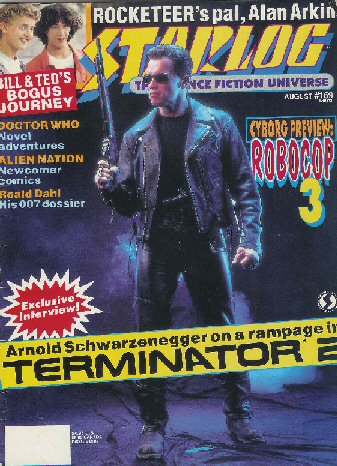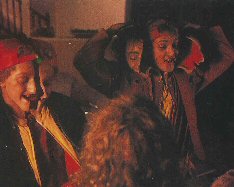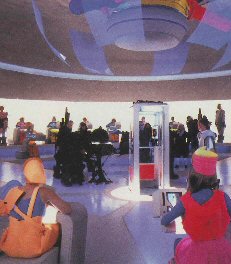
 |
Bill
& Ted's Excellent Set Visit
between
Heaven & Hell, two excellent dudes play twister with Death
by
Bill Warren
| STARLOG
will go to any lengths for its readers. This time, it went to
Hell. And Heaven. Coincidentally, both are located in Valencia,
California, or at least they were for the lensing of Bill &
Ted's Bogus Journey, formerly Bill & Ted Go To Hell. Hell,
you may be interested to know, consists of big red rocks chained
in orbit around a bigger red rock. Heaven is dressed in off-white
and pale lavender columns and amphitheaters, resembling a Caesar's
dream of a perfect Rome. It's also a delight for set workers,
since the humongous pillars, 10 feet through at the base, are
on small hidden wheels, so they can be shoved around at director
Peter Hewitt's command. The columns resemble colossal chess pieces
as they drift quietly around the smooth white floor at the base
of the stairs that lead to God. Alex Winter, who plays Bill, actually
prefers Hell. Bill
& Ted |
|
 |
From
a brief glimpse of Heaven, Yagher and his crew deserve the applause.
The nightmare bunny head is awesome, with big, evil green eyes,
giant buck teeth and a gleefully demented expression. Also in the makeup trailer are the heads of Evil Bill and Evil Ted (or maybe it's the good robot duplicates!) and the various bodies of Station, the alien scientist who comes to Earth with the resurrected Bill & Ted and the Grim Reaper. |
| Heaven
& Hell About Station, Hewitt says, “We have an alien who’s the definitive Bill & Ted. He was born out of the idea that they are one guy in two bodies. When he’s two aliens, he’s incredibly dumb, and just lumps around and has fun. At one point in the film, he runs to the end of a parking lot and smashes into himself, and becomes one alien. Now he’s incredibly intelligent and constructs the good robot Bill & Ted’s.” Bill & Ted’s Excellent Adventure was released in 1989, after a delay. Scott Kroopf, who produced both films, explains that he loved the script for the first film, written like the second by Chris Matheson and Ed Solomon. “We immediately optioned it, and within 24 hours got a call from Warner Bros., “ who were also interested in the script. “We went into business with them, and through a development project that lasted four years at the end of which they said they didn’t want to do it. So, we ended up doing it at DEG. Unfortunately, the DeLaurentis Entertainment Group went belly-up just then, leaving the completed Stephen Herek directed movie in a kind of limbo. “We were desperate that the movie not just go to video immediately,” says Kroopf, “so we got together with Nelson Entertainment; they made a lowball offer on it and got it. At this point, the movie had never been previewed, but it turned out to be very successful.” The picture had been hanging in the wings so long that teenage movies had gone out of vogue – and has come back in. In it’s theatrical release, Bill & Ted’s Excellent Adventure appealed primarily to teenagers, since that was the intended market, but when it hit video, it gained a whole new audience of older viewers, who appreciated the oddball film both for the simple, even sweet, sincerity of the two leading characters, and for the inventive imaginative fun that Matheson and Solomon had with time travel. Bill & Ted, those two airheads from San Dimas, looked like they might be the new Abbott & Costello, or Laurel & Hardy – but they're actually more like say, Laurel and Costello, in that both are good natured idiots. Because the first film was so successful a sequel seemed inevitable. While conceding that profits were the main motivation Kroopf points out that "Chris and Ed always had an idea in mind for the sequel. It was our feeling that you could see these guys go on and take on other adversaries. They immediately came up with the idea of Bill & Ted going to Hell and dealing with everything in the afterlife." Herek was tied up with another film, so Kroopf and his partners at Interscope began looking for another director. "The first thing we decided was that we would go with a younger, more daring director. We made the choice to go with someone to whom this would be their most important film, so we met with about 50 different young, up-and-coming directors, and finally settled on Peter Hewitt. "The basis of our decision was that his short film [The Candy Show] was brilliant. In 30 minutes, he created a world that was all-encompassing, very detailed, very rich, and he did the picture for £18,000, so all of the talent and imagination obviously came from inside him. We needed someone who was very imaginative and could help us tackle all of the challenges set for ourselves, in such an ambitious story." Peter & Scott If Peter Hewitt makes a movie as well as he makes an impression, this guy could be the next Spielberg. He's a tall, slender, handsome Brit, making his feature directorial debut on an FX-laden, $20 million production - and even at the end of the shoot, he's calm, relaxed, thoughtful. He's clearly intelligent, has complete control over the film, and is as unflappable as a grizzled veteran. "It's my first film, so I'm finding my feet. I am very interested in the way things look; I've always been interested in how things are put together. I've followed Industrial Light & Magie very closely. When they started up around Star Wars, I got into that, and I was sort of a special FX freak, trying to work out how they did this, how they did that. It's really fun to have those toys to play with now. "What it does mean is that at times, no matter what you do, the performance almost always takes a back seat, which is something you really have to keep a hold of. Something I was anxious to avoid was to have Bill & Ted dwarfed by all their surroundings. That hasn't happened. Having been with those guys for the past three months, I know it is impossible for anything to dwarf them." The script, he assures us, "is great. Matheson and Solomon weren't interested in churning out another sequel for the sake of it. What they were interested in was - and I'm sure everyone says this about every single sequel - to do something new, fresh and different. This isn't a time travel film at all; they meet historical figures, but the historical figures are only a fun nod to the first film." This one is a sweeping, epic journey, and with the presence of De Nomolos, Bill & Ted have a genuine opponent. Hewitt adds, "I think this film will show that Bill & Ted can get older, they can grow up, and it still works." He likens Bill & Ted specifically to Laurel & Hardy, big personal favorites of his, "but with these two, there's no sense of one needing the other more; it never comes into question that one of them might want to do something else and go away." Hewitt is not only a special FX fan, but he's very fond of comic books - his desk is piled high with Moebius graphic albums - and he's deeply interested in directing the announced Judge Dredd movie. But he's also aware of film history, and cites the late Michael Powell (Thief of Baghdad, A Matter of Life and Death, Peeping Torn) as a principal influence, along with genre veterans Steven Spielberg, George Lucas, Ridley Scott and Terry Gilliam. After The Candy Show made a big influence on many in Hollywood, Hewitt was sent the usual pile of scripts; Bill & Ted Go to Hell (the title he prefers) caught his eye. I'm a big fan of A Matter of Life and Death, It's a Wonderful Life, Here Comes Mr. Jordan (we have a boxer in Heaven who carries a clarinet), so it was appealing to do Heaven and Hell. My first reaction was how wonderful it would be to do this, because of all the incredible places I would get to create. My concern was that it would be difficult to tie them all together stylistically. |
|
 |
"What
I finally plumped for was a lot of domes, spheres and circles. Heaven
is a series of large discs on which cities sit. In the future, we
use a large dome as Rufus' classroom. In Hell again, it's this large
spherical rock around which orbit these smaller spherical rocks."
Surprisingly, he adds, "Whether this all comes through is immaterial;
what it does is give me a solid base to work from. I like to have an internal logic to everything. That makes me much more confident about doing anything.You can say to someone, 'Be silly,' and they'll be silly, but if you say 'Be silly because this and this happened to you,' they'll be silly with a lot more confidence." |
Bill & Ted are indeed silly, but they aren't like Station, one guy in two bodies. "Actually, they are very different. You can sum it up this way," Hewitt explains. "Ted is the one who always says, 'What do we do?' Bill thinks about it, then says, 'I don't know, what do you think?' Then, Ted comes up with the answers, saying. 'Why don't we do this?' And Bill says, 'Yeah, that's brilliant!' So, Ted is always under the illusion that Bill is coming up with these ideas, while it's really Ted himself." Winter and Reeves, he points out, "know these characters incredibly well," having not only played the roles in the first film, but having done the voices for the current cartoon series, too. "My job with them, more often than not, is just to sit there and laugh at what they are doing, and occasionally suggest things. Ordinarily, they'll chat among themselves and come up with great stuff. It was fun to work with them."
Death & Twister "There's an actor I worked with a long time ago," says Sadler, explaining how he developed the character, "who wud talk like siss all dah time. He waz fram Czechoslovakia. and I sought it waz fahnny. Well, Death isn't from New Jersey. So I put on the accent, and in the auditions, I gave them this kind of timeless dead eyes that people get when they're in the death business. When I started saying the lines with that accent, looking like that, it was funny. The more serious you play it, the funnier it gets. "Pity poor Death. Tons of uneventful work, and now these two yahoos challenge him for the right to return to their unfinished lives. As in The Seventh Seal, in which Death plays chess with a crusader, the Grim Reaper in Bill & Ted's Bogus Journey takes on the heroes in games of chance. But here it's a video game, Battleship, Twister and Clue. And they beat the socks off Death. "Best two out of sree?" he uneasily suggests, but they still whomp him. "It's the worst day Death has ever had," laughs Sadler. "The most humiliating, the worst possible set of events." He begins to worry about being liked. "Don't zhoo like me?" he plaintively asks Bill & Ted. "We come back to Earth with Station, the scientist from another planet, and go to a Builders' Emporium. Death has never been involved in any Earthly ventures before, and now, he's trying to save the babes. By the movie's end, he's singing a rap song in the Battle of the Bands, and playing bass in Wyld Stallyns-and enjoying the hell out of it. He becomes thoroughly Bill & Ted-ized." Kroopf and Hewitt hope the audience will be, too. Kroopf is placing his confidence in Hewitt, who, he says, "has the quality of really talented directors, of being able to have an incredibly strong vision of what he wants, and just enough flexibility so that he can fool with it a bit when he 's on the stage" If 'two shots need abruptly to be combined, "he gives you a shot that is brilliant and does do it all in one. It's a little unnerving, because that's the confidence and boldness of a director who has done it a thousand times before." As for Peter Hewitt, he feels the appeal of the movie rests in Bill & Ted themselves. "Everybody at some time in their life has had a friend they can communicate with without even looking. You find yourselves opening your mouths and saying the same things at the same time, you speak in the same inflections. I suppose the appeal is that, two buddies having a good time." |
|